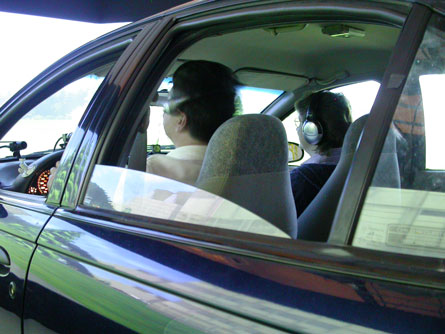Cell phone distraction while driving is a two-way street
When operating a car, drivers lose a grip on messages they hear
Cell phone conversations don’t just interfere with driving. Driving dents the capacity to describe and remember cell phone messages, at least for some of the youngest and oldest drivers, a new study finds.

Routine driving impedes a person’s ability to relay information from a cell phone call accurately to a conversation partner and to remember key elements of that information, say psychologist Gary Dell of the University of Illinois at Urbana-Champaign and his colleagues. Although many drivers regard talking while cruising a straightaway as no harder than walking while chewing gum, “that intuition is incorrect,” Dell says.
Both older and younger drivers seated next to a passenger and operating a vehicle in a simulator had more difficulty correctly retelling brief stories, versus retelling stories while sitting in an unmoving “car,” the researchers report in the February Psychonomic Bulletin & Review. Participants, especially those over age 60, remembered less about stories after simulated driving than after sitting in the unmoving car. That might reflect a greater emphasis on defensive driving among older drivers.
Driving skills, such as rapid reactions to approaching vehicles in intersections, also took a hit while retelling the stories, the investigators say. Earlier studies have reported that driving worsens while talking on cell phones or sending text messages.
These new findings challenge the belief that work productivity benefits by conducting important conversations, such as business negotiations, while commuting.
“Safety concerns aside, if the quality of a conversation matters to your business, then it is best to reserve your conversation for times when you are not operating a motor vehicle,” remarks psychologist David Strayer of the University of Utah in Salt Lake City. Strayer studies the impact of cell phone use on driving skills.
Dell’s team studied 96 pairs of adults, each consisting of a driver and a partner. Half the volunteers ranged in age from 18 to 21; the rest were in their 60s and 70s. Drivers sat in a car facing a projection screen that allowed them to navigate through a virtual city. They were told to drive down a city street and through several busy intersections while obeying a speed limit of 30 miles per hour, staying in the center of the lane and stopping at stop signs.
After an initial trip without talking, drivers on subsequent trips listened to and then retold a series of 10- to 20-second stories heard over a hands-free headphone. Partners did the same during other trips.
In another condition, drivers and passengers listened to and retold stories in an unmoving car. Drivers but not passengers in a “moving” simulator retold a smaller number of central story elements, such as the nature of a robbery. They described nearly 70 percent of story elements correctly in an unmoving car, as did passengers. That figure fell to 60 percent while driving on straightaways and to 50 percent while going through intersections. Passengers’ accuracy at retelling stories remained the same regardless of condition.
Story retelling in the new study roughly corresponds to a driver or passenger listening to a half-minute podcast or cell phone message and then relaying that information along, Dell says. Actual driving presents dangers that divert attention from what’s said more than virtual driving does, he adds.







